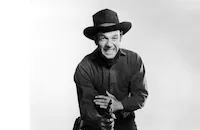Sunday Punch

Brief Synopsis
Cast & Crew
David Miller
William Lundigan
Jean Rogers
Dan Dailey Jr.
Guy Kibbee
J. Carrol Naish
Film Details
Technical Specs

Synopsis
At Ma Galestrum's Brooklyn boardinghouse, only male boxers reside, under the guidance of their trainer, Roscoe, who subscribes to the "no dames allowed" rule set by Matt Bassler, the boxers' owner. An exception is made, however, when Ma's niece Judy, a singer whom she reared, returns home. Judy's difficult tour of Europe at the start of World War II has convinced her that marriage to a nice wealthy man is the only thing for her, and she determines to find one. Ma's janitor, Olaf "Ole" Jensen, develops a serious crush on Judy, as does boxer Ken Burke, a former medical student. Though Ken pretends to dislike Judy because of her gold-digging, they soon fall in love. That same night, when Ole learns from Ken how much money fighters earn, he determines to become a wealthy man for Judy. Bassler refuses to consider an amateur like Ole, but "Pops" Muller, a down-on-his-luck manager, decides to take him when Ole's "Sunday Punch" knocks out a professional boxer. Pops also arranges a road trip for Ole, despite Ken's concern that Ole needs to develop his boxing skills. Not realizing Ole's true feelings for her, Judy kisses him goodbye and gives him a flower, strengthening his resolve to marry her. Meanwhile, Bassler, who fears that Judy will ruin Ken's boxing career, offers her a singing contract that includes an out-of-town trip. Ken is angry and disappointed in her for accepting the job, and when he receives his acceptance letter from Johns Hopkins Medical School, he tears it up and continues boxing. Months later, Ken has become a contender for the title, as has Ole. Bassler and Pops try to arrange a bout between the two, but both fighters refuse the $30,000 offer because of their friendship. Desperate to have a winning fighter, Pops convinces Ole that the money will help him win Judy, so he reluctantly agrees to fight. On the night of the fight, "Biff," another fighter, overhears Bassler and Roscoe discussing what they have done to Ken and Ole. Because Biff's allergies are forcing him to quit the ring and move to Arizona, he convinces Bassler to allow him to manage some local fighters in exchange for his silence. At the arena, Biff receives a draft notice and starts to feel guilty about his actions, so he tells Judy everything. She goes to Ken's dressing room, but when he refuses to listen, she goes to Ole and tells him that although she loves Ken, she wants him to lose so that Ken will give up the ring and return to school. Ole is hurt, but realizes that Judy and Ken belong together and promises to do his best. During the grueling fight, neither boxer can knock the other out. Judy begs Ken to throw in the towel, but he refuses, just as Ole refuses Pops's request to do the same. Finally, Olaf lands a "Sunday Punch" and wins the match, after which he helps Ken to his chair. In his dressing room, Ole tells a confused Ken that "the best man won," and Judy follows Ken out of the arena. A short time later, Ken and Judy are married at Ma's boardinghouse. As they are about to enter a taxi, the cab driver starts a fight with another driver, and Roscoe is happy that he has found a good replacement for Ken, who is going back to school.

Director

David Miller
Cast

William Lundigan

Jean Rogers

Dan Dailey Jr.

Guy Kibbee

J. Carrol Naish

Connie Gilchrist

Sam Levene

Leo Gorcey

"rags" Ragland
Douglass Newland

Anthony Caruso
Tito Renaldo
Michael Browne

Bernard Zanville
Dick Wessel
Dave Willock
Lester Matthews
Alfred Hall
Floyd Shackelford
Duke York
Sammy Shack
Edward Earle
Marcia Ralston
George Offerman
Pat West
Tom Hanlon
Bob Ryan
Ernie Alexander
Eddie Simms

Cyrus W. Kendall
Lester Dorr
Frank Richards
Syd Saylor
Gaylord Pendleton
Al Hill
Matt Mchugh
Sam Ash
Russ Clark
Frank Hagney
John Raitt
Robin Raymond
John Roche
Carl Leviness
Crew
Albert Akst
Daniele Amfitheatrof
Cedric Gibbons
Keogh Gleason
Kalloch
Fay Kanin
Fay Kanin
Michael Kanin
Michael Kanin
Al Raboch
Allen Rivkin
Gabriel Scognamillo
Douglas Shearer
David Snell
Irving Starr
Paul Vogel
Edwin B. Willis

Film Details
Technical Specs

Articles
Sunday Punch
Producers: Irving Starr
Director: David Miller
Screenplay: Michael Kanin, Fay Kanin (story and screenplay); Allen Rivkin (writer)
Cinematography: Paul Vogel
Art Direction: Cedric Gibbons
Music: Daniele Amfitheatrof, David Snell (uncredited)
Film Editing: Albert Akst
Cast: William Lundigan (Ken Burke), Jean Rogers (Judy Galestrum), Dan Dailey Jr. (Olaf 'Ole' Jensen), Guy Kibbee ('Pops' Muller), J. Carrol Naish (Matt Bassler), Connie Gilchrist (Ma Galestrum), Sam Levene (Roscoe), Leo Gorcey ('Biff'), Rags Ragland ('Killer' Connolly), Douglass Newland ('Baby' Fitzroy).
BW-77m.

Sunday Punch
Quotes
Trivia
Notes
According to an unidentified February 25, 1942 news item contained in the AMPAS Library file on the film, professional boxers Eddie Simms, Fred Seel, Abie Bain, Tommy Garland and Cy Schindell were to be in the cast; only Simms is credited elsewhere, and the participation of the other men in the released film has not been confirmed. Hollywood Reporter news items include John Indrisano, Henry Jordan, Frank Grandetta, Rito Punay, Mickey Phillips, Cliff Danielson, Sig Froelich, Rudolph Cameron, Louis Natheaux, Robin Raymond, Lew Smith and Edward Kilroy in the cast, but their participation in the released film has not been confirmed. Sunday Punch marked the screen debut of actor Dane Clark (1913-1998), who appeared as "Bill." At the time of the film's production, Clark was acting under his real name, Bernard Zanville.















